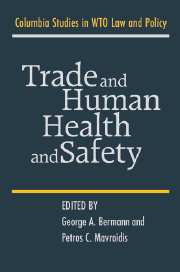Book contents
- Frontmatter
- Contents
- Preface to the Series
- Introductory Remarks
- 1 A Map of the World Trade Organization Law of Domestic Regulation of Goods
- 2 The WTO Impact on Internal Regulations: A Case Study of the Canada–EC Asbestos Dispute
- 3 Reflections on the Appellate Body Decision in the Hormones Case and the Meaning of the SPS Agreement
- 4 The Salmon Case: Evolution of Balancing Mechanisms for Non-Trade Values in WTO
- 5 Lotus Eaters: Reflections on the Varietals Dispute, the SPS Agreement and WTO Dispute Resolution
- 6 Regulatory Purpose and “Like Products” in Article III:4 of the GATT (with Additional Remarks on Article III:2)
- 7 The WTO Standard of Review in Health and Safety Disputes
- 8 Expert Advice in WTO Dispute Settlement
- 9 Domestic Regulation, Sovereignty and Scientific Evidence Requirements: A Pessimistic View
- 10 Time for a United Nations' “Global Compact” for Integrating Human Rights into the Law of Worldwide Organizations: Lessons from European Integration Law for Global Integration Law
- Index
8 - Expert Advice in WTO Dispute Settlement
Published online by Cambridge University Press: 27 July 2009
- Frontmatter
- Contents
- Preface to the Series
- Introductory Remarks
- 1 A Map of the World Trade Organization Law of Domestic Regulation of Goods
- 2 The WTO Impact on Internal Regulations: A Case Study of the Canada–EC Asbestos Dispute
- 3 Reflections on the Appellate Body Decision in the Hormones Case and the Meaning of the SPS Agreement
- 4 The Salmon Case: Evolution of Balancing Mechanisms for Non-Trade Values in WTO
- 5 Lotus Eaters: Reflections on the Varietals Dispute, the SPS Agreement and WTO Dispute Resolution
- 6 Regulatory Purpose and “Like Products” in Article III:4 of the GATT (with Additional Remarks on Article III:2)
- 7 The WTO Standard of Review in Health and Safety Disputes
- 8 Expert Advice in WTO Dispute Settlement
- 9 Domestic Regulation, Sovereignty and Scientific Evidence Requirements: A Pessimistic View
- 10 Time for a United Nations' “Global Compact” for Integrating Human Rights into the Law of Worldwide Organizations: Lessons from European Integration Law for Global Integration Law
- Index
Summary
Introduction
In the WTO's seven years of existence, six panels appointed scientific experts. Two panels requested expert advice from other international organisations and one panel appointed a linguistic expert. This stands in contrast to one single resort to experts by GATT 1947 panels. Very often parties to a WTO dispute also nominate experts on their delegation, be they lawyers, economists, scientists or linguists. On top of that, an increasing number of ‘outsiders’ or amici curiae, such as Non-Government Organizations (NGOs), but also industry and academics, have pressed their (expert) opinion on WTO panels. What explains this increase in expert advice before the WTO?
Firstly, WTO agreements became more technical, both in the trade/economic sense (refer, for example, to the Agreement on Customs Valuation and the Agreement on Agriculture) and the factual/scientific sense (refer to the SPS and TBT agreements). Indeed, some WTO agreements themselves set up expert bodies (such as the Permanent Group of Experts under the Subsidies Agreement and the Technical Committee on Customs Valuation under the Customs Valuation Agreement).
Secondly, certain WTO obligations adopt an explicitly economic/scientific criterion of legality, set out either in the WTO treaty itself (such as the requirement to ‘base’ sanitary measures on a ‘risk assessment’, SPS Art. 5.1) or as developed in WTO jurisprudence (such as the condition of a certain degree of ‘competitive relationship’, based largely on market studies, for products to be ‘like’ under GATT Art. III).
- Type
- Chapter
- Information
- Trade and Human Health and Safety , pp. 235 - 256Publisher: Cambridge University PressPrint publication year: 2006
- 2
- Cited by



